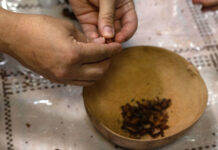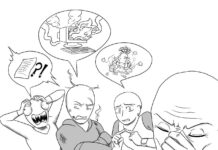
Guatemalan poet Miguel Ángel Oxlaj Cúmez began his talk to a Salt Lake Community College audience on Feb. 21 with stories from the past. He recalled the moment he thought to himself, “If my humanity was going to be ridiculed, why would I speak [it]?”
Cúmez said Spanish colonizers often punished, beat or killed Indigenous people for speaking their mother tongue. And the subsequent rise of the Spanish language resulted in corn – of great significance in Kaqchikel culture – being used against them.
“They would make us kneel on corn kernels until we admitted that Kaqchikel was useless,” he said, because speaking Indigenous languages was seen as a sign of savagery.
Cúmez’s words two weeks ago were part of an event called “Mother Tongues and Their Right to Coexist.” It focused on the systemic erasure and importance of Indigenous languages and was presented primarily in Spanish (translation devices were made available). Fellow poet Rosa Maqueda Vicente, from México and of the Hñähñu people, joined Cúmez as the second speaker.
Put on by Salt Lake Community College’s Latin American Studies Program and the nonprofit Artes de México en Utah (Arts from México in Utah), the event had a focus on languages within Latin America. Both speakers detailed the story of their respective languages and the roots of erasure and discovery. They also touched on history.
Before the Spanish colonization of modern-day México in the 16th century, one could find an estimated 350 Indigenous languages across the region. As of 2020, only 5.8% of people in Latin American regions speak Indigenous languages.
Carolina Bloem, associate professor of Spanish and director of the Center for Latin American Studies at SLCC, said language can be a tool of resistance. She added that, while some may not realize it, Spanish has become the erasure tool for Indigenous languages in Latin America.
Bloem remarked that these languages are not simply tools of communication. When a language dies out, so does a whole block of knowledge and words.
For Cúmez, continuing to speak his mother tongue is a way to respect and “[honor] the memory of the pueblo’s.”
Vincente said she often questioned whether her culture left a legacy. She shared how her need to reconnect with her own mother tongue came from the realization that her education was only centered on Mayan history. There existed a denial of her own roots that motivated her to learn past that one history.
“Being a part of a collective pushes you forward,” said Vincente while on the topic of her poetry, which one can find on the site Siwar Mayu (“A River of Hummingbirds”). The Siwar Mayu project looks to highlight Indigenous languages through poetry from different artists, which includes work from Vincente and Cúmez.
Executive director of Artes de México en Utah, Fanny Guadalupe Blauer, attended the event and shared a familial story of reconnection. The story stemmed from her grandfather, who held regret for not learning his mother tongue.
“I ask for forgiveness from my mother,” Blauer said, recounting her grandfather’s final words, “because she spoke to me in her mother tongue, and I never answered. I ask for forgiveness of you because you carry her name but not her language.”
Andrea Silva, a staff member of Artes de México en Utah, said events like these raise the question of where our languages come from, and, although some people may not speak a mother tongue, it can lead them to question where their language originated from.
“It is important to question where you come from, who you are, and who you want to be,” Silva said.







